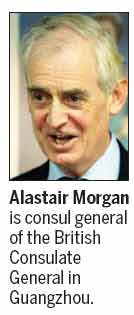UK businesses look beyond big cities
Updated: 2011-01-28 12:38
By Li Wenfang (China Daily European Weekly)
The British Consulate General in Guangzhou, capital of Guangdong province, is looking beyond first-tier cities and business majors in its consular area to expand bilateral trade and investment.
The Consulate General is tasked with supporting the UK economy like other diplomatic offices in China.
Alastair Morgan, the new consul general of the consulate who assumed the post in December last year, announced the moves to the media on Jan 27. The consular area covers Guangdong, Hunan, Jiangxi, Fujian and Hainan provinces as well as the Guangxi Zhuang autonomous region in southern China.
 |
Chinese second-tier cities, not well known by UK businesses, have seen faster growth in many cases and face challenges in green development, where UK companies stand a chance with their environmental and low-carbon expertise, he says.
Morgan, accompanied by a dozen UK companies, visited Changsha, capital of Hunan province, and Nanchang, capital of Jiangxi province, earlier this month and plans to lead them to more cities in the area.
Although large Chinese State-owned enterprises and resources firms have led outward investment in the three decades of the country's reform and opening-up, small and medium-sized companies and technological firms with intellectual property, among others, have been encouraged by the Chinese government to follow suit, he says.
"They are in much more favorable condition to go global," he says, citing Shenzhen-based China Merchants Bank's launch of a representative office in London in 2009 and the Guangzhou-based Xiangxue Pharmaceutical setting up its own R&D center in Cambridge at the end of 2010.
The UK side wants to work with Chinese companies like BYD, a battery and electric car maker, in low-carbon applications, he says, pointing also to the retail, information and communications technology, life sciences, engineering and creative industries as potential areas for cooperation.
The consulate in Guangzhou, like other diplomatic offices, have received instruction from the British government to support the UK economy as it takes a stronger approach in bringing prosperity to the country.
The consulate "will work very, very hard" to fulfill the trade and investment agenda, he says.
Trade and investment between China and the UK does not reflect the size of the respective economies, with China being the world's second-largest economy and expected to become the largest in the middle of this century, Morgan says.
The UK accounts for less than 1 percent of all imports into China and less than 1 percent of all outward investment from China. China receives less than 1 percent of all outward investment from the UK and less than 3 percent of all UK exports.
China is the UK's second-biggest trading partner after the European Union, while the UK is Beijing's third-biggest trade partner in the 27-nation bloc. Trade in goods for the first 10 months of 2010 hit a record high of $40.2 billion (29.3 billion euros), with the target for goods and services trade set at $60 billion for the year.
The two sides have agreed to increase bilateral trade to $100 billion by 2015.
In the 2009-2010 fiscal year, China was the sixth-biggest foreign investment source for the UK, while the number of Chinese companies investing in the country was the second highest. Alongside Germany, the UK is the EU's top investor in China and more than 16,000 UK companies are registered in China.
With the size of the population in the consular area similar to that of the EU, the consulate bears "huge responsibility" in expanding the UK's interest in the area, Morgan says. Guangdong province alone accounted for about 27.7 percent of China's foreign trade in 2009.
In his short time in Guangzhou, Morgan has walked "quite a lot" around the city and seen the trading activities and the hum in the west of the city.
Morgan pledges tailored services and free, confidential advice to Chinese investors and effective and fast visa services.
He plans to promote more effectively the UK's capacities in all fields, like those in the creative industries which the public is less aware of, by better joining the efforts of the various departments of the consulate, including the creative and low-carbon sections.
He will continue to practice Internet diplomacy for better interaction with the public via new media to "get out the message more effectively".
E-paper

Pearl paradise
Dreams of a 'crazy' man turned out to be a real pearler for city
Literary beacon
Venice of china
Up to the mark
Specials

Power of profit
Western companies can learn from management practices of firms in emerging economies

Foreign-friendly skies
About a year ago, 48-year-old Roy Weinberg gave up his job with US Airways, moved to Shanghai and became a captain for China's Spring Airlines.

Plows, tough guys and real men
在这个时代,怎样才"够男人"? On the character "Man"
